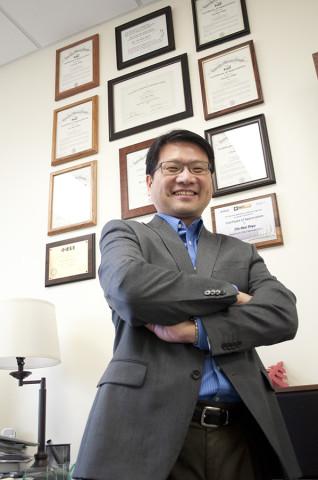BIG DATA
NSF grants $1 million to MU

Initiative will lead to faster research results and timely sharing of information across the region
The National Science Foundation (NSF) has awarded $1 million in two grants to the University of Missouri to install a supercomputer enabling data-intensive research and education at MU in fields such as bioinformatics, geoinformatics, high performance computing and engineering applications. The grants also will fund the position of a cyberinfrastructure (CI) engineer at MU. Together, the equipment and expert personnel will lead a network of data analysis capabilities at MU that will be shared with other campuses within the University of Missouri System.
"Research advancements sometimes are hampered by the ability to process the huge amounts of data scientists are collecting," said Chi-Ren Shyu, chair of the Department of Electrical and Computer Engineering in the College of Engineering and director of the Informatics Institute at MU. "Often, researchers with computationally intensive tasks have to rely on large computer clusters offsite to 'crunch' that data which can take weeks or even months. With the advancement of cloud computing and Big Data technologies, researchers can cut that time and produce results more efficiently. The advanced equipment provided by this grant will enable scientists and engineers to team with computational researchers to understand the bottleneck of data analytics and identify efficient hybrid computer cloud environments for faster and more accurate scientific discoveries."
 Calyam, University of Missouri-Columbia, will investigate the roles, computer resources and policies needed to enable hybrid cloud research collaborations at MU. | ||||
The initiative will create a secure cloud network that can seamlessly connect local and remote users as well as public cloud infrastructures to meet the data-intensive research needs of its users. Shyu and his team have collaborated with several MU researchers who are conducting studies, including round-the-clock health monitoring, plant science and genomics, photo-driven and graphics-intensive research, and other data-intensive studies that will use the state-of-the-art technologies.
The new cyberinfrastructure (CI) engineer, will collaborate with researchers to develop new tools and provide the expertise needed to quickly adapt the network, analyze it for efficiency and ensure that scientists are receiving proper insights from their data.
"The CI engineer project will investigate the roles, computer resources and policies needed to enable hybrid cloud research collaborations at MU," said Prasad Calyam, assistant professor of Computer Science and leader of the CI Engineer project at MU. "We will test configurations and conduct analyses on how the new supercomputer system works to help researchers get their information quickly while providing guidance to scientists and university-based supercomputer initiatives. Our aim is to develop new knowledge and become the model for hybrid clouds in other supercomputing hubs throughout the U.S."
Shyu predicts that the equipment and new CI expertise also will provide a cost savings for future research projects as MU scientists will be able to determine the most cost-efficient cloud setting without outsourcing their computing needs. Using currently funded research projects at Mizzou will help perform real-time analyses that will provide valuable information to researchers and educators planning future projects and curriculum design at MU and other institutions in the UM System and state of Missouri.
